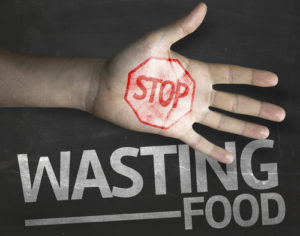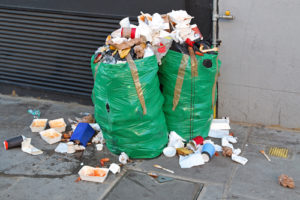You may have read or seen a recent video about Food Waste, and how two very well-known chefs prepared lunch for world leaders, who were meeting about climate and sustainable goals. The lunch was not an ordinary lunch, as it was made entirely from ingredients that were food waste. Their point: Food and sustainable agriculture are an important part of the energy transition discussion. The US News  article goes on to say that at a household level, the average family throws out $640 annually, which means as a local economy, we could save $300 billion from wasted food.
article goes on to say that at a household level, the average family throws out $640 annually, which means as a local economy, we could save $300 billion from wasted food.
Although most Americans are bothered by the enormous food waste in the U.S., just 15% of them make the connection between food waste and the negative impact it has to our environment. Food waste in the food service industry is one of the most recognizable areas of food waste in the United States. According to End Food Waste Now, a restaurant can produce an average of 150,000 lbs. of garbage a year.
Stop Food Waste! Here’s How:
- Bulk food is not ideal for everyone. Whether are serving a lot of people in a restaurant or cafeteria or just making a Costco trip, it can be tempting to buy more. Determine what you need carefully so you don’t overbuy. If you are buying in bulk, have the planning and menus in place to eat the food before it goes bad.
- Plan to use expiring foods first. Common sense, but know when you purchased foods and when they are expiring so you can plan to use those first. If you put food in the freezer, mark it with a date so you use it before it has been stored too long. Be sure to understand the expiration dates like “Use by” and “Best by”, and “Sell by” to avoid throwing food out.
- Examine before you buy. Whether you are buying fruits, vegetables, dairy, or any food, take a close look to see how close it is too ripen, spoil or expire. Don’t rush to pick the food that is in the front of the shelf.
- Communicate with your grocery store or food vendors. Let your food vendors know how important it is to our environment that we are all minimizing waste. They may have some advice or insight into best practices for purchasing foods while minimizing waste. It may also be good to ask them how they handle food waste.
- Prepare that grocery list and menu. Preparing a menu out as far ahead of time as you can
 will give you room for flexibility while maximizing the foods you have on-hand. Take a close inventory of what you have in the kitchen, freezer, pantry, and storage to avoid over-buying what you already have.
will give you room for flexibility while maximizing the foods you have on-hand. Take a close inventory of what you have in the kitchen, freezer, pantry, and storage to avoid over-buying what you already have. - Pair kids’ food with purpose. In a school cafeteria setting or at home, there is no doubt there will be food wasted – particulariliy vegetables or other foods that are not favorites of kids. This Washington Post article offers a simple idea for pairing vegetables with main dishes in a way that doesn’t leave as much veggie food waste.
- Compost food waste when you can. Some school cafeterias (with the support of students, school board, and parents) have began composting food scraps with a lunch room composting program. It can be complex but is a great way to reduce landfill waste at school or home. In some cities, restaurants are required to compost – others are doing it voluntarily. This New York Times article highlights some of the challenges and triumphs.
Hopefully the tips above can give you some ways to minimize food waste overall. It is inevitable that you will have some waste, and of course, some recycling. If you are interested in learning more about managing waste and recyclables in your kitchen or cafeteria, please contact us. Our goal at Harmony Enterprises, Inc. is to make a global impact by helping people better manage their waste and recyclables.
Interested in reading more articles on recycling, reducing waste, and helping or global environment from Harmony Enterprises? Subscribe to our monthly e-newsletter here.
You may also be interested in these posts:
Recycling in Restaurants is becoming more Prevalent
Restaurants get Smart with Trash Collection
Tips for Schools: Recycling & Waste Management
Harmony Featured Product: Stainless Steel Trash Compactor
